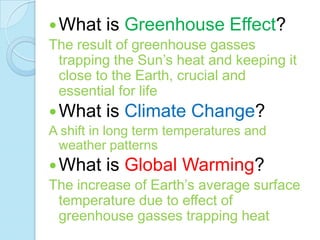Global warming is a pressing issue that has garnered attention from people all around the world. It is a phenomenon that refers to the increase in the average temperature of the Earth's atmosphere and oceans, primarily due to the increase in greenhouse gases that trap heat from the sun. These gases, such as carbon dioxide, methane, and water vapor, are essential for the Earth's climate and make life possible on the planet. However, the increase in their levels has led to a warming of the Earth's surface, which can have negative impacts on the environment and human health.
The main cause of global warming is the burning of fossil fuels, such as coal, oil, and natural gas, which releases large amounts of carbon dioxide into the atmosphere. The use of these fuels has increased significantly in the past few centuries, particularly during the Industrial Revolution, and continues to do so today. Other human activities, such as deforestation, agriculture, and waste production, also contribute to the increase in greenhouse gases.
The consequences of global warming are far-reaching and varied. One of the most significant impacts is the rise in sea levels, which is caused by the melting of glaciers and polar ice caps. This can lead to coastal flooding and the displacement of communities living near the ocean. Global warming also causes more frequent and severe natural disasters, such as heatwaves, droughts, hurricanes, and wildfires. These events can have significant economic and social costs and can lead to loss of life.
The impacts of global warming are not limited to the natural environment. It can also have significant health effects, such as heatstroke, respiratory problems, and the spread of vector-borne diseases. It can also have negative impacts on agriculture and food security, as extreme weather events can damage crops and disrupt food production.
There are many ways in which individuals and governments can take action to address global warming. One of the most effective ways is by reducing the use of fossil fuels and transitioning to renewable energy sources, such as solar, wind, and hydroelectric power. This can be done through individual actions, such as using energy-efficient appliances and public transportation, as well as through policy changes that incentivize the use of clean energy.
Another way to address global warming is through conservation and sustainable land use practices. This can include planting trees, which absorb carbon dioxide from the atmosphere, and protecting natural habitats, such as forests and wetlands, which play a vital role in regulating the Earth's climate. Governments can also implement policies that encourage the use of sustainable practices in industries, such as agriculture and forestry.
In conclusion, global warming is a complex and pressing issue that requires immediate action to mitigate its negative impacts. While there are many challenges and obstacles to addressing global warming, there are also numerous opportunities for individuals and governments to take meaningful and effective actions. By working together and taking a holistic approach, we can create a more sustainable and healthy future for ourselves and the planet.






